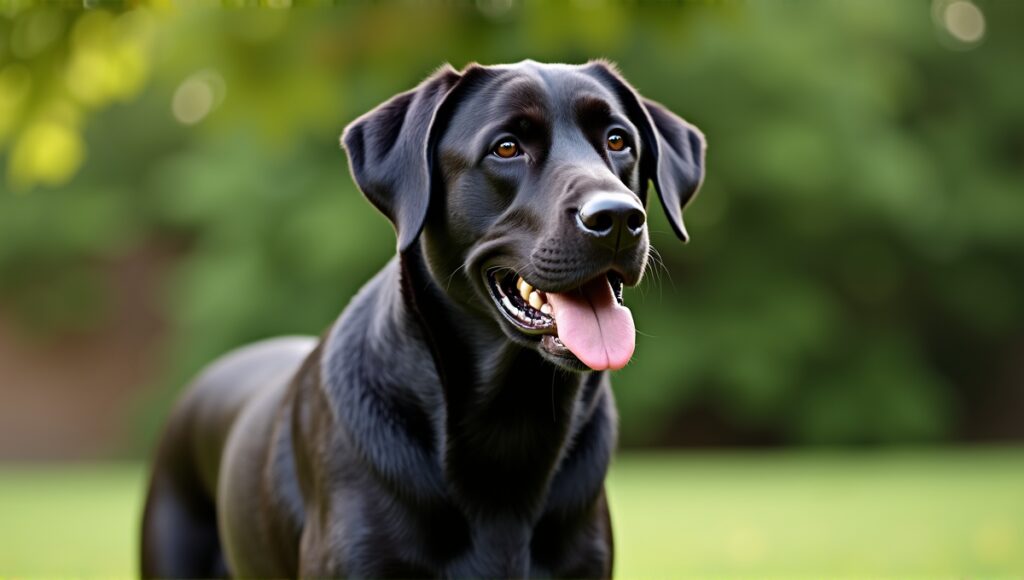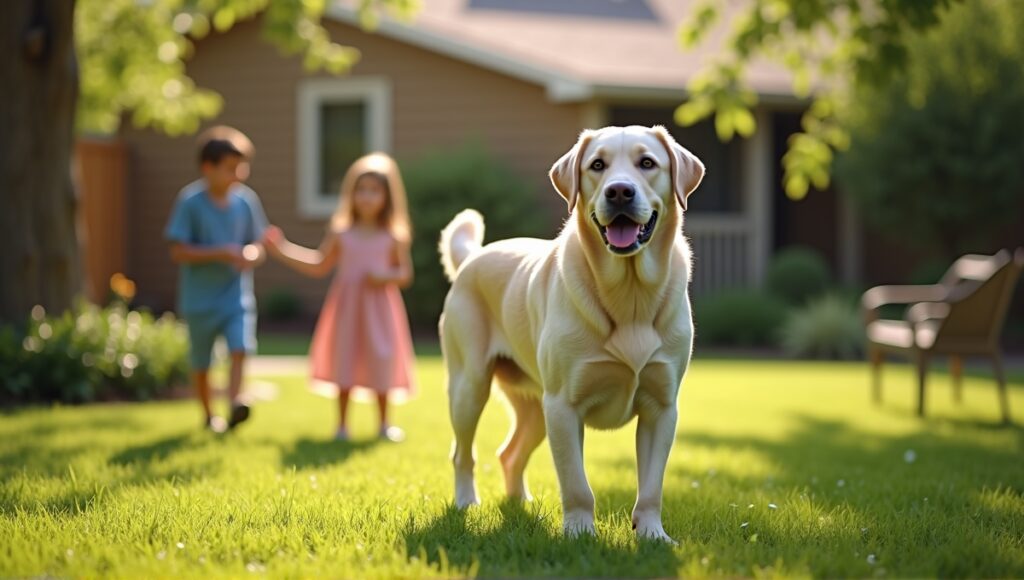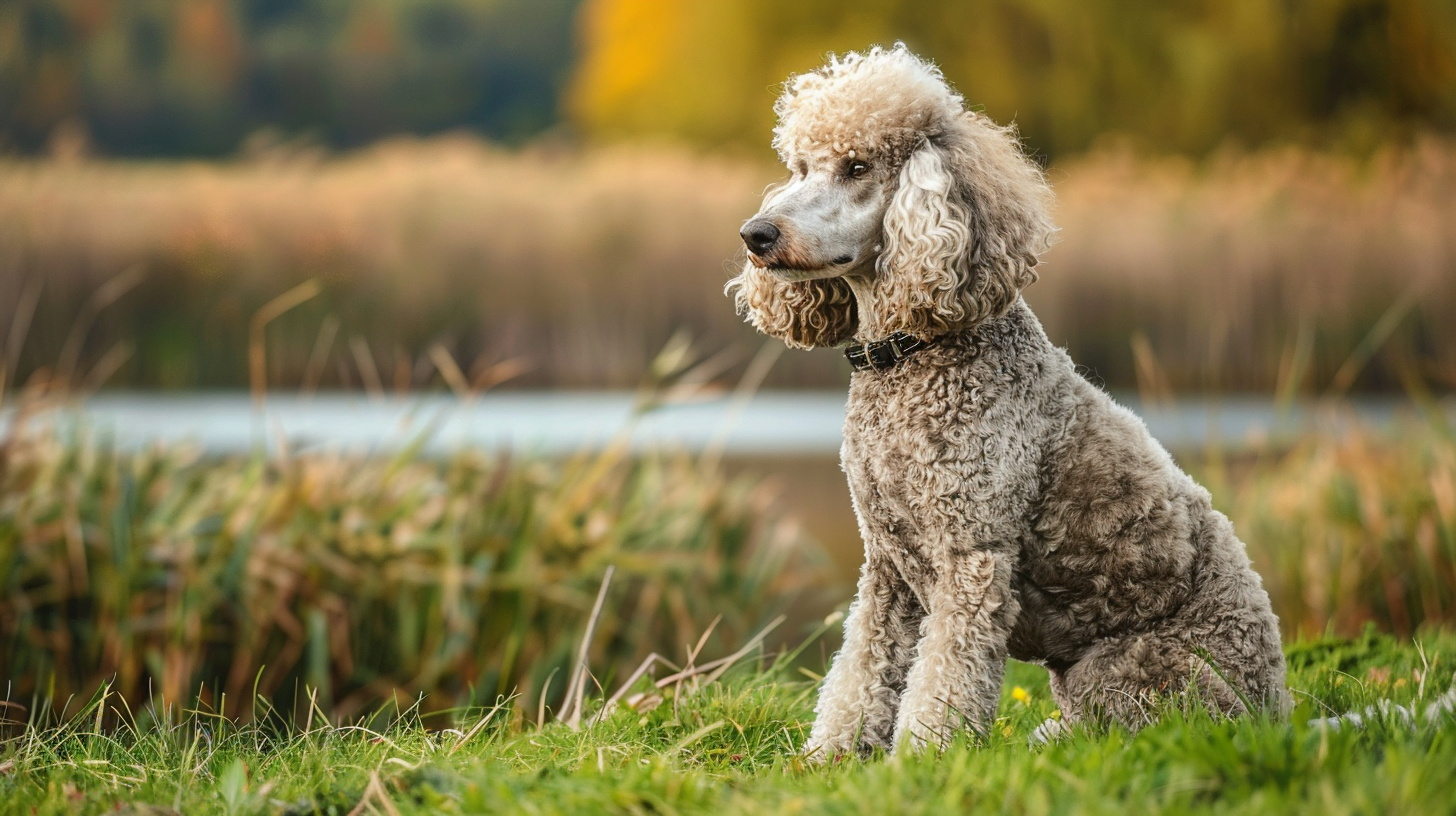I’ve been around dogs all my life, and I can assure you Labradors aren’t your standard guard dogs. However, that’s not to say they aren’t capable of guarding your home. These lovable giants possess a few unexpected characteristics that could qualify them as the ideal security dog for your family. So, can Labradors actually make good guard dogs?
Labrador Retriever Characteristics as Guard Dogs

Labradors are large dogs with a kind, friendly demeanor. They measure 21.5 to 24.5 inches at the shoulder and weigh 55 to 88 pounds. These stocky dogs live for about 10 to 12 years. Here are a few key characteristics of Labradors:
- Stocky, athletic build
- Wide head with friendly eyes
- Short, dense, water-repellent coat
- Thick, otter-like tail
I’ve trained Labrador Retrievers for many years. They’re gentle and affectionate dogs. Labradors are very people-oriented and have a mild temperament. This makes them excellent dogs for families and less suitable as guard dogs.
Labradors have a strong retrieving drive. They’ll play fetch until they collapse. They don’t, however, have the guarding instincts of a German Shepherd or Rottweiler.
Their friendly nature is both a strength and a weakness. Labradors are more likely to greet an intruder with a wagging tail than a growl. While they will bark to alert you, they generally won’t take a more aggressive posture.
In my experience, Labradors are better suited as family dogs than guard dogs. They’re very loving and loyal, but they don’t have natural guarding instincts. If you specifically want a guard dog, consider a different breed. For families looking for suitable pets, exploring options like small mixed breed dogs may be beneficial.
Debunking Myths About Labrador Guard Dogs
Let’s debunk some misconceptions about Labs as guard dogs. Many people assume all large dogs are good guard dogs. While this isn’t true, Labs are often mistaken for guard dogs due to their size.
However, there’s a significant difference between a watchdog and a guard dog:
- A watchdog alerts you to potential threats,
- a guard dog takes active steps to protect against perceived threats.
As a result, Labs make great watchdogs. They’ll alert you to any visitors, but not much more.
When Labs see a stranger, their typical response is curiosity or friendliness. They may bark, but it’s usually more out of excitement than aggression. I’ve met Labs who greeted burglars like old pals!
In other words, don’t expect a Lab to protect your home through aggressive actions. Labs are simply too friendly to be a guard dog.
Advantages of Labrador Retrievers for Home Protection
While Labs aren’t guard dogs, per se, they can still provide protection. Their sheer size alone can deter people from entering your home. Most burglars don’t want to deal with a big dog. Additionally, Labs have excellent senses. They will notice things you might overlook, which can be helpful for home security. They’re also very loyal to their families. Though they won’t attack, they may intercept if they sense a direct threat to their family members.
Labs also have a deep bark. This can alert you to potential dangers in your home. Additionally, the best way to deter a burglar is to make your home a less desirable target. A big dog barking can make a burglar think twice. Labs are also agile and versatile.
The average burglary rate is 340.5 per 100,000 people. Every 30 seconds, a burglary occurs in the United States. Even if the Lab is just a friendly dog, their presence can still be a great deterrent. I learned from my years in the shelter that even a friendly dog’s size and bark makes potential adopters nervous. The same goes for potential intruders.
Here’s how Labs can help deter intruders:
- Their loud bark can alert you to potential threats
- Their size can intimidate would-be burglars
- They’re alert and will notice unusual activity
- They can adapt to various living situations making them versatile protectors
Limitations of Labrador Retrievers as Guard Dogs

However, Labs are not the best guard dogs for the same reason they are the best family dogs: their friendly personalities. Labs are specifically bred to be social and friendly. This makes them great companions, but terrible guard dogs.
Labs don’t have the natural aggression that guard dogs need. A Lab is more likely to greet an intruder than attack them. I’ve personally witnessed a Lab excitedly show a burglar where to find the family’s most valuable items!
Labs require a lot of exercise, and a tired Lab is less likely to wake up if someone breaks into your home. Labs are also easily distracted. Even with an open back door, a squirrel in the backyard could be enough to distract a Lab.
Purpose-bred guard dogs, such as Dobermans and Malinois, are different because they have a strong natural instinct to protect and the bravery to attack threats. Labs simply do not have this instinct.
Just remember that Labs are retrievers, not guard dogs. Asking them to be a guard dog is asking them to do something they were not bred to do.
Training Labradors for Protection Work
While Labs aren’t natural guard dogs, they can pick up guard dog behaviors with proper training. Through basic obedience, a well-behaved dog is more likely to listen to you when it counts.
Socialize your Lab. The more people, places, and situations your Lab experiences, the better they become at distinguishing typical behavior from suspicious behavior.
You can train your Lab to bark. This alert bark is often enough to scare off intruders. You can also establish property lines in their mind.
You can teach some guard dog behaviors, but be cautious. You don’t want to train aggression into this breed.
Invest in professional protection training if you’re serious about making your Lab a guard dog. Look for:
- Private trainers with protection training experience
- Group classes teaching guard dog behaviors
- Scent training to make your Lab more alert
- Professional protection dog training
If you decide to pursue training, remember to mold the Labrador’s natural instincts into the desired behavior. Don’t try to fundamentally change the Labrador.
Socializing Labrador Guard Dogs
Proper socialization is important for any dog, especially a protection dog. So, start early. Dogs learn the most at the time when they’re a puppy, between 3 and 16 weeks.
Expose your Lab to as many different environments as possible. This includes:
- parks
- busy streets
- various homes
Have them meet people of all ages, sizes, and races.
Your goal is to strike a balance between friendliness and alertness. If your Lab is properly socialized, they should feel comfortable in common situations, yet still be alert.
When you socialize your Lab with new people or other animals, remain calm and be positive. Your dog will take cues from you. If you’re calm, they’re more likely to be as well.
Socialization isn’t something you only do once. You should continually introduce your dog to different experiences throughout their life. This will ensure your Lab is adaptable and confident.
In my opinion, the best protection dogs are Labs that have excellent socialization. They should be friendly, yet alert enough to notify you of anything that’s not quite right.
Labrador Retrievers as Family Guard Dogs

Labs have ranked as the most popular dog breed in the US for many years, and it’s easy to see why. They make excellent family dogs.
Labs are very gentle with children, and they have the patience to endure a lot of rough play. Plus, they are large enough that they won’t get injured easily. I’ve seen Labs act as a giant teddy bear for kids.
Your Lab will be a great companion and will also act as a mild deterrent to any would-be intruders. Their size and deep bark will make most people think twice. That said, they are generally not going to harm anyone.
Just create a safe, comfortable environment for both your Lab and your family.
- Train your kids early on to respect the dog’s area and belongings, and not to pull on ears or tails.
Keep in mind that Labs aren’t aggressive guard dogs. They are first and foremost a sweet family dog that will also help keep your family safe. With the right approach to training and socialization, they strike a great balance between friend and protector.
For those considering a variety of family pets, looking into the best small family dogs can provide additional insights. If you’re interested in smaller dog options.
To Sum It Up
Labradors make excellent family protectors, even though they aren’t your typical guard dog. Their size, bark, and loyalty all work in your favor, and with the right training and socialization, they’ll let you know if they sense danger while still behaving like a friendly dog. Just keep in mind that at the end of the day, a Lab is a friendly pet. While a Lab might not be the most aggressive protector, their sheer presence can help make your home more secure.






